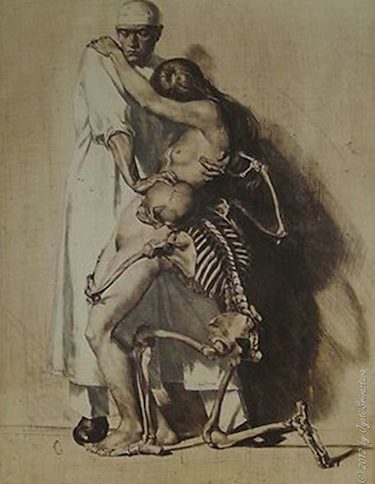Dealing with death, Miguel Torga
Coimbra, 10 December 1958
Twenty-five years now that I’ve been battling death professionally, and I feel more incapable than ever of understanding and accepting it. Halfway between the peasant in the pure state and pure intellect, when death comes calling I find neither the peace of the credulous person who regards the slow decline of his existence as a natural cycle nor that of the intellectual who interprets life in terms of mental categories.
Whenever I spy death at a patient’s bedside, I always react in an instinctive and precipitous way. Without waiting to hear more, I set about combating it tooth and nail, with all the means at my disposal. I exhaust the arsenal of the pharmacopoeia and of hope. And in putting myself almost physiologically in the patient’s skin, and in making use of all the treatments science puts in my hands, I fight until I’m exhausted. And when it’s death that triumphs, I accept my defeat — but only pragmatically. Conquered but not convinced, I steady my knowledge and my resolve, and prepare myself for the next combat. And that’ll be the end of me, saying no to death.
Extract from Miguel Torga’s diary – pages 18-22 of the pdf, translated from Portuguese by Iain Bamforth
Commentary
What is the healthy way to deal with death? Although a popular topic of discussion, answering it remains harder than Rubik’s cube.
Torga describes his attitude towards death from his position as a physician. It is not a typical one in the 21st century. His fight against death was passionate, transcending limits that would have been in place in an easily defeated mind.
Miguel Torga (pseudonym of of Adolfo Correia da Rocha) was a 20th century Portuguese writer famously known for his 16 volume diary. His writings are mainly autobiographical. They hold some wisdom, a lot of truth, and several moments of epiphany. He was observant, and those patients whose lives touched him in some way, he learnt about them, and wrote compulsively and reflectively. In his low-resource setting, he made sure that his patients were seen, heard and treated with dignity.
Torga was an atheist and pushed back at the authoritarian rule prevalent in his country at that time. His writings provide a rare insight into the lives and emotion behind medical practice for the commoners of Portugal at the time.
Further info
- Miguel Torga – A brief biography
- Medicine in Torga’s literary work – Abstract on PubMed highlighting some medical elements in Torga’s work
- Image: Der Artz (ca. 1920–1925) – by Ivo Saliger (Austrian, 1894–1987)
Contributed by
Lekaashree Rambabu


Torga’s attitude to death:
‘Pugnero con la morte’ — I shall fight against death! Claudio Monteverdi 1607,